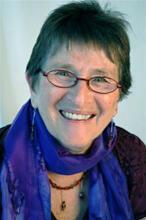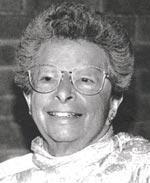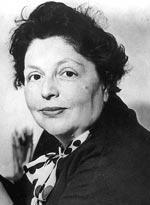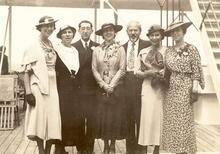Judith Laikin Elkin
The historian Judith Laikin Elkin was a pioneer in the field of Latin American Jewish Studies, especially in the English-speaking world. After a career as a U.S. Foreign Service Officer and some years raising two daughters, Elkin received a PhD at the age of 48. As a scholar, she produced The Jews of Latin America, the foundational text in its field, which was first published in 1980 and subsequently in revised and updated editions. She is best known as the Founding President of the Latin American Jewish Studies Association (LAJSA) and is especially remembered for encouraging other scholars, whether junior or well-established, to venture into Latin American Jewish studies.
Childhood and Early Career
Born in Baltimore, Maryland, on June 7, 1928, Judith Laikin was the daughter of immigrants who arrived from Russia and Lithuania at the turn of the twentieth century. The family then settled in Detroit, Michigan. Her parents were devoted to Zionism and Yiddish culture. Her father, Ben, owned a factory that manufactured wiping cloths; her mother, Chana Leah, was a seamstress and housewife. Elkin had three sisters, Pnina, Shevi, and Shulamith. She learned Yiddish in a weekly reading group that her father led in their home. She attended the afterschool Farband Folk Shule, an educational project ahead of its time where students were taught, among other subjects, modern Hebrew. She earned her undergraduate degree in English from the University of Michigan in 1948 before pursuing her master’s degree in international relations, which she completed in 1950 at Columbia University.
In 1952 Elkin began her career as a U.S. Foreign Service Officer. In an era before federal anti-discrimination legislation, she was the only woman in her class of 24. Her experiences at five U.S. embassies in Asia and her travels through the region would later provide the material for her first memoir, Krishna Smiled: Assignment in Southeast Asia (1972). Elkin would retrospectively come to realize that as a young woman she had enjoyed much greater liberty than most of her female contemporaries in the 1950s United States. She appears to have derived considerable satisfaction from her diplomatic career, meeting a wide variety of people and traveling, although as a Jewish woman she often felt like an outsider. In her memoir Walking Made My Path, she often mentions how very few women were employed in the Foreign Service. At one point she somewhat acidly refers to one of her rare Jewish colleagues and herself as “one underemployed Jewish aeronautics expert and one Jewish pawn” (p. 74).
In 1954, Elkin received an invitation from Moshe Sharett, then Prime Minister of Israel, to join the Israeli Ministry of Foreign Affairs. As a Zionist and an American, she had to make the crucial decision of whether her future homeland would be the United States or Israel. In Walking Made My Path, Elkin summarizes in some detail the thoughts that led her to decline Sharett’s offer, concluding: “Not to dwell on the agonies with which I punished myself in subsequent years, that afternoon I walked away from what may have been the best offer I would ever receive. I never felt so American as when I left the Prime Minister’s office” (p. 53).
The Domestic Years
Elkin decided to bring her diplomatic career to an end to start a family; at the time, female Foreign Service officers were required to leave their posts if they planned to marry. Her marriage to Sol M. Elkin—an administrator in the Detroit school system, later a college professor, and then a labor negotiator—lasted 47 years until his death. She was the mother of two daughters, Alissa Ruth Leonard and Susannah Zisk, and had four grandchildren, Sarah, Talia, and Abigail Leonard and Sam Zisk. In her memoir Walking Made My Path, she describes the shocking transition from her life as an independent, world-traveling young woman to existence as a housewife. She belatedly grasped the importance of feminism. As she explains: “Having spent years persuading myself to marry; more years accustoming myself to what I considered the proper role of a wife, I had internalized the traditional view of marriage” (Walking Made My Path, p. 112). She eventually realized that this role was plunging her into depression and that she needed meaningful work. At the same time, Elkin recognized that her husband held unusually egalitarian views for his time and place and that her daughters brought her joy.
During the years when her children were young, Elkin had various forms of on-and-off employment. She worked as a free-lance journalist, writing for two Detroit newspapers: the Free Press and the Reporter. Relegated to the category of “faculty wife” while her husband taught university courses, she was occasionally hired as an adjunct instructor of history and political science. Despite these various jobs, she had nothing that added up to a career.
Return to Scholarship
After seeing her two daughters through their early years, Elkin decided to pursue a PhD and began to explore the history of Jews in Latin America. The first faculty members she approached about supervising her doctoral dissertation discouraged her; their assumption appeared to be that Jews had not been important in Latin American history. She eventually succeeded in making the case to Charles Gibson, future President of the American Historical Association, that her proposed study could make a significant contribution. Although he was a specialist in colonial Latin American history and Elkin’s research was on Jewish life in the nineteenth and twentieth centuries, Gibson agreed to be her dissertation director. He advised her “not to haul bricks, but to build an edifice” and to view her future doctoral thesis “not as a mere dissertation, but as a book.” Consequently she composed her dissertation, “History of the Jews of Latin America in the Nineteenth and Twentieth Centuries,” for the general educated reader.
Elkin’s PhD in History from the University of Michigan was awarded in 1976, the year she turned 48. She then revised her dissertation to publish it as a book. Jews of the Latin American Republics, as it was called in its first edition, appeared in 1980. This volume was subsequently revised, with the most recent expanded and updated edition appearing in 2014 under the title The Jews of Latin America. In the words of eminent Jewish historian Jonathan Sarna, “It remains the most influential English-language synthesis of the field.” Elkin also published two guides to existing research on the topic. The 1980 Latin American Jewish Studies appeared at a time when this area of study was barely emerging. A more extensive bibliography, Latin American Jewish Studies: An Annotated Guide to the Literature, appeared in 1990 and was co-compiled by Elkin and Ana Lya Sater.
Elkin taught for many years at Albion College in Albion, Michigan, and at various points in her career offered classes at Wayne State University and The Ohio State University. At the University of Michigan she sometimes taught and at other times served in staff positions. Because she was never appointed to a tenure-track position at a research university, she was unable to carry out some of the activities that would normally be exercised by such a widely respected scholar, such as supervising doctoral dissertations. However, after founding LAJSA (Latin American Jewish Studies Association) she informally mentored scholars at other institutions, discussing their work with them and critiquing drafts of their manuscripts. She did so out of a desire to see the field of Latin American Jewish studies take hold and grow.
Founding of LAJSA
By any reckoning, the most significant legacy of Elkin’s postdoctoral career is her creation and nurturing of LAJSA. Elkin began by creating a directory of researchers and community leaders interested in Latin American Jewish topics. Identifying these individuals and compiling their contact information was a laborious task in the era before the internet. She then began mailing to these far-flung colleagues, for free, a print newsletter she published using a copier on her dining room table. The mailing list and bulletin would eventually provide the basis for LAJSA.
During the early 1980s, Elkin discovered that students of Latin American Jewish life and culture were repeatedly being met with rejection when they proposed papers and papers for the congress of the Latin American Studies Association (LASA). After unsuccessfully seeking to persuade LASA to create a track specifically for Jewish Studies, she resolved to establish the Latin American Jewish Studies Association as an autonomous network. It became an official organization in 1982. Elkin’s association with colleagues in AMILAT, an Israeli association for researchers of Latin American Jewish topics, started during her early visits to Israel in the late 1970s. This collaboration resulted in the first joint international conference in the framework of the World Congress of Jewish Studies in 1985 and continued throughout her life.
Throughout the 1980s, Elkin was either the principal coordinator of or closely involved in the organization of the early conferences of LAJSA. The first LAJSA conference, focused primarily on information gathering, was held 1982 in Cincinnati, site of the American Jewish Archives. Elkin edited a proceedings volume, Resources for Latin American Jewish Studies. She co-edited, with Gilbert W. Merkx, a multi-authored volume, The Jewish Presence in Latin America (1987), containing revised versions of essays presented at the 1984 LAJSA conference at the University of New Mexico.
After concluding her term as President in 1995, Elkin continued to be a significant force in LAJSA. She edited the newsletter for several more years and participated in LAJSA conferences well into the twenty-first century. Elkin devoted an enormous amount of time to maintaining personal contact with colleagues pursuing research on Latin American Jewish topics. Even when they were well established in their careers, she offered them encouragement and helpful suggestions.
In her later years, Elkin composed a second memoir, Walking Made My Path (2011). While Krishna Smiled is full of colorful anecdotes from the author’s career, often exuberantly narrated, Walking Made My Path is more revealing of the author’s personal life. The most painful passages appear in Elkin’s account of the years in which she was primarily a mother and a faculty wife, as well as experiencing isolation in a small town in Michigan almost entirely lacking the support of a Jewish community. Having a career to pursue clearly gave her a sense of purpose and lifted her spirits. In the final chapter of Walking Made My Path, Elkin tells of the growth of LAJSA from its prehistory in her mailing list of colleagues up through the 2011 LAJSA International Conference held at Arizona State University. Readers of this essay will come to appreciate how intimately the story of LAJSA was intertwined with the unfolding of the author’s life since completing her PhD.
The week after Elkin turned 85, she participated in the 2013 International Research Conference of LAJSA at the University of Texas at Austin. During her last decade, she continued to follow the association closely and remained in contact with longtime members. At the time of her death on January 14, 2024, she held a permanent post on the LAJSA Board of Directors.
Elkin organized researchers in this field of studies when there were few people involved in it. She was a strong leader, setting guidelines as LAJSA developed its path forward. She was a historian who made history.
Selected Works by Judith Laikin Elkin
Krishna Smiled: Assignment in Southeast Asia. Detroit: Wayne State University Press, 1972.
Jews of the Latin American Republics. Chapel Hill, N.C.: University of North Carolina Press, 1980.
The Great Lakes Colleges Association: Twenty-one Years of Cooperation in Higher Education. Ann Arbor: Great Lakes Colleges Association, 1982.
Latin American Jewish Studies. Cincinnati: American Jewish Archives, 1980.
(Ed.) Resources for Latin American Jewish Studies:Proceedings of the First Research Conference of the Latin American Jewish Studies Association, Held on the Cincinnati Campus of Hebrew Union College-Jewish Institute of Religion on October 30-November 1, 1982. Ann Arbor: Latin American Jewish Studies Association, 1984.
with Gilbert W. Merkx, eds. The Jewish Presence in Latin America. Boston: Allen and Unwin, 1987.
with Ana Lya Sater. Latin American Jewish Studies: An Annotated Guide to the Literature. Westport, CT: Greenwood, 1990.
Walking Made My Path. Bloomington: iUniverse, 2011.
The Jews of Latin America, 3rd. rev. ed.Boulder: Lynne Rienner, 2014.











